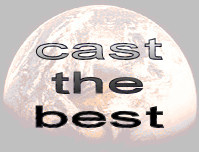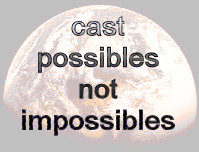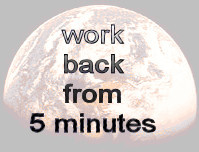Think "script" when recording and CASTING
You have to concentrate on the product all the pre-production process
Casting - get as wide a range of possibles as possible

| CAM = Casting a Mate (friend) - there are good reasons to do this and sometimes bad reasons! You welcome working with someone you know and trust, and can persuade to do more time in the studio. But all that matters is the broadcast product. You have to be the best PRODUCER (business side -casting, marketing). |
| 'Your course is not a DATING AGENCY!' This is a joke - but it has a serious side - you can meet someone you find attractive - or just good to work with - in auditions. But you must cast for the best! There is no other way! |
| As students, you are marked on the product. There is no other choice - you have to find the very best actors. |
| You have to think of the full range of actors in scenes together. You have to get these actors together in auditions - see suggestion below. You have to beware of CLUSTERING (voices which sound too like each other and are confusing for the listener). |
| AN ECONOMICAL WAY TO SELECT FROM AUDITIONS: This is the marvellous invention of Nanette Aldous (2004-5). Audition various actors for a 2-hander scene using the same script (a short scene). Then work on Adobe Audition - put the different candidates together edited in various combinations of 2. This gives you the freedom to try out different conbinations. You are not likely to have the luxury of getting all the candidates together. |

| PLEASE DO NOT GET CAUGHT IN SCRIPTING CHARACTERS AND SITUATIONS THAT YOU CANNOT CAST SUITABLY FOR. Look at who you can cast. Work this out from the first SCRIPTING DEVELOPMENT MEETINGS. |
| GETTING THE RIGHT SIZE FOR YOUR EPISODES. This is one of the most difficult requirements in scripting. If you over-write script, and / or if you record too much in production, this creates a much greater problem in post-production for you. |
| Best to sort this out as soon as possible, at the scripting stage. You have to time your scenes, and the effects and the music bridges. Read out your script for an episode and time each scene. Allow extra seconds for effects and for scene boundaries, and for the intro and extro credits. |
| Agree on the INTRO and EXTRO credits and music, as soon as you can. So that you all know what tops and tails each episode. |

Notes from a student - about scripting and being able to cast, and post-production:
I had an interesting problem arise when I recorded a scene meant to be performed in a workshop.
Without paying particular attention to this detail, I focussed on the words in the scene, and recorded it. I then tried to post-produce it, and realised how unrealistic it sounded to have actors drilling, hammering and using power tools yet speaking to each other in their normal speaking voices.
It was such an obvious mistake that my only choice was to re-record that scene, this time having them shout the words to each other as if trying to compete with the other 'workshop noises' that are surrounding them.
This worked much better and is a mistake which in the "real world"
would have cost me in time, actor's wages and studio space - none of which
I could probably afford.
Also, at other times, I got so carried away in post production that I ignored
my script instructions for music bridges or fade ins/outs. This only became
obvious towards the end of the project when I was trying to paste the scenes
together into episodes, and found that I had ignored the script instructions
.
TO SOAP PROJECT